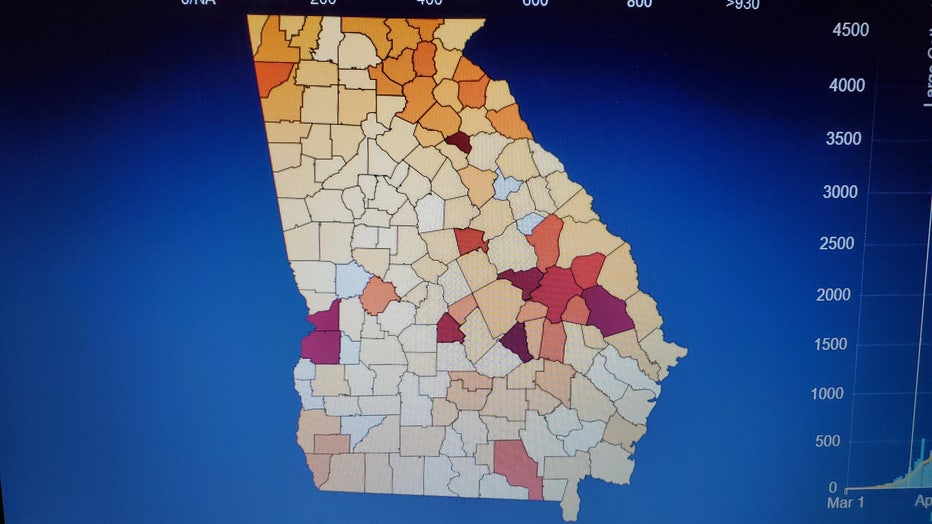Georgia shows signs of progress in coronavirus fight, but college outbreaks concern experts

College COVID-19 concerns remain a concern
Georgia coronavirus cases are dropping, but outbreaks around college campuses are a concern.
ATLANTA - Georgia's COVID-19 numbers continue to improve this week, with new confirmed coronavirus cases down nearly 11% and the state's 7-day positivity rate hovering at just over 8%.
Microbiologist Amber Schmidtke, who is tracking the pandemic for her COVID-19 newsletter and podcast, is carefully watching outbreaks on the state's college and university campuses.
Two Georgia cities made the New York Times’ list of the top 10 cities where the outbreak is worst now, based on the number of new cases relative to their population for the last two weeks.
Athens, home to UGA, is #4 on the Times’ list.
Statesboro, home to Georgia Southern University, is #7.
"What's interesting about all of those top 10 cities, is, they're college towns," Schmidtke says. "So, this is a problem that is not necessarily unique to Georgia, it's happening nationwide."

Map from the Georgia Department of Public Health shows counties with the highest number of new coronavirus cases over the last 14 days.
As of September 10, 2020, Clarke County, which includes Athens and UGA, has reported 1,511 new COVID-19 cases in the past two weeks, according the Georgia Department of Public Health.
Bulloch County, home to Georgia Southern, has reported 910 new cases the last 14 days.
This week, the White House Coronavirus Task Force's latest report urged Georgia public health officials to increase the testing and isolating of college students, to keep them from spreading the virus to their local communities and hometowns.
RELATED: Governor, public health commissioner urge all Georgians to get COVID test
The Task Force also recommended recruiting college students to help with public health messaging and contact-tracing.
Schmidtke says the idea of training students to track clusters of infections makes sense.
"Think about it this way: we all tend to take information best from our peers," Schmidtke says. "So, most of us are not likely to answer a phone call from an area code we don't know. In that same way, a lot of us are less likely to talk to people about whom we've had contact with, if that person is an authority figure."
To encourage students to be open and honest about their potential exposures, Schmidtke says, contact tracing on college campuses cannot be punitive.
"I think it's more important to get the information, so that we can limit transmission, than to worry about punishing people," she says. "We need to incentivize honestly as much as possible."
Sign up for FOX 5 email alerts
What to do with students who get sick or are exposed to someone infected presents another challenge for colleges and universities.
In early August, a spokesperson for the University System of Georgia, Lance Williams, told FOX5 the system’s colleges and universities had identified dorms to isolate students who have been infected by or exposed to the novel coronavirs.
Williams said they will be strongly encouraging students who feel ill to isolate.
"And that isolation, we prefer, to be their home, their permanent home," he says. "Because that's where they can get the best care from their family. But, that's not always going to be possible. In those cases there are living arrangements that have been made in all 26 institutions for those isolation situations that need to occur."

Harvard expert shares why thinking about morality rates mid-pandemic is ‘distracting’
Harvard expert shares why thinking about morality rates mid-pandemic is 'distracting'
That at-home isolation strategy raised concerns from some health officials, including members of the President’s Task Force, who say sending students home could put their families and communities at risk of being infected.
This week, the Task Force report says students "should not be sent home to isolate and quarantine."
Schmidtke agrees.
"The very last thing we want to do is have super spreader events on a college campus, and then send those students home to infect their family members, some of whom may be among our medical fragile or vulnerable," she says.
Schmidtke believes keeping Georgia’s colleges and universities open this fall and winter will require buy-in from everyone on campus, especially the students.
She is urging them to wear masks, social distance, and take a long-term approach to keeping their campuses safe.
"I think it's more important that you have your school open for the full year than have a great big party this weekend, for example, just so that you can have fun,” Schmidtke says.
That message applies not just to college students, but everyone, Schmidtke says.
The Task Force is urging Georgians to avoid gatherings of more than 10 people.
In a sign of progress, the Task Force is longer calling for a statewide mask mandate.
RELATED: CoronavirusNOW.com, FOX launches national hub for COVID-19 news and updates.

